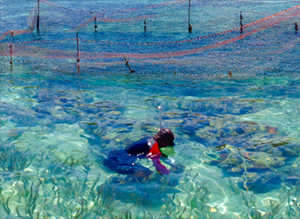Award value estimated to be: $6500*
 A travel award has been endowed by Dr. Daniel Pauly and The University of British Columbia for a deserving international graduate student who needs support for research or field work to be conducted in their region or country of origin.
A travel award has been endowed by Dr. Daniel Pauly and The University of British Columbia for a deserving international graduate student who needs support for research or field work to be conducted in their region or country of origin.
In adjudicating the award, first preference is given to students associated with the Institute for the Oceans and Fisheries, second preference to students in resource management, third preference to students in zoology, and fourth preference to those in forestry.
The award is made on the recommendation of the Institute for the Oceans and Fisheries in consultation with the Faculty of Graduate and Postdoctoral Studies.
2023 Winner
Ayodele Oloko (PhD, OCF)
2022 Winner
Kate Colson (MSc, OCF)
2021 Winner
Ema Fatima (PhD, OCF)
2020 Winner
Roshni Mangar (MSc, OCF)
Previous Winners
Caroline Graham
Caroline Graham, MSc student in Oceanography, plans to use the award to visit researchers in Alaska, Washington, Oregon, and California to gather more information on salmon diets and to communicate her research creating an open-access database which collates all available information on salmon diets in the marine environment across the North Pacific to better understand salmon trophic ecology. A the funding will assist her in the critical part of this project; connecting with salmon researchers who have relevant data and may be interested in using this database as a tool for scientific research.
Tashi Tsering
Tashi Tsering, PhD student in the UBC IRES Resource Management and Environmental Studies Program, plans to use the award to help fund his field research on climate change implications on agrarian society and water management in the arid Himalayas. Concerned about the interest of marginalized contemporaries such as subsistence farmers living in climate-sensitive regions, he is interested in exploring social and fairness issues of sustainabilty and climate change. His field site is the Spiti Valley in the Indian state of Himachal Pradesh, a high-altitude desert region where farmers are fully dependent on snow and glacial melt water for irrigation. This research aims to make two important contributions: Investigate how social and cultural practices in the region are sculpted by water resource availability, and to document indigenous perspectives on climate change.
Lydia Teh
Ms Lydia Teh’s research project aims to develop a systematic zoning procedure for marine conservation and fisheries management that integrates human behavioural, socio-economic and ecological attributes across space that at the same time requires minimum investment in technology, labour, and data, such that it is readily accessible to data-poor and resource limited tropical fisheries in developing countries. Her field work was carried out in the Semporna Islands Group in south-eastern Sabah, Malaysia, over two months in 2008 to gather ecological and socioeconomic data for representation in fuzzy sets; and to investigate socio-ecological relationships that will help to formulate realistic heuristic rules governing human aspects of site selection. She conducted interviews with fishers to investigate their perceptions and knowledge of ecological and socio-economic dynamics in the reef fisheries, their spatial fishing patterns, and their responses and adaptation to real or perceived social, economic, and ecological changes in the reef fisheries. Interview responses will be analysed to form relationships between ‘attributes’ and ‘descriptors’ within the fuzzy model. Other field activities included creel surveys and rapid underwater assessment using ReefCheck to examine coral reef habitat status and validate fishers’ information.
Louise Teh
A PhD student in the Resource Management and Environmental Studies Program, Louise Teh conducted an investigation of the discount rates of small-scale fishers in the Sulu-Sulawesi Marine ecoregion. Her research aims to address two main questions: 1) How does integrating the time preferences of fishers affect fisheries management strategies? 2) What ecological and socio-economic factors may influence the discount rates of fishers? She did two months of field research at Banggi and Semporna Islands, Sabah, Malaysia, conducting fisher surveys and monitoring fish landings. Ms Teh then intends to estimate individuals’ discount rates and evaluate the cost of management from the fishers’ perspectives. Finally, she will use GIS software to investigate what socio-economic, ecological and governance characteristics of the fisheries may affect discount rates.